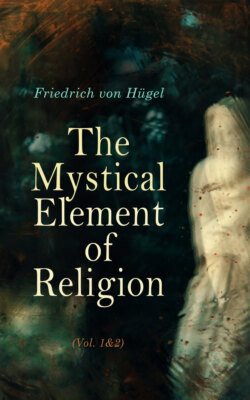Читать книгу The Mystical Element of Religion (Vol. 1&2) - Friedrich von Hügel - Страница 33
На сайте Литреса книга снята с продажи.
4. Science to be taken, throughout our life, in a double sense and way.
ОглавлениеIn such a conception of the place of Science, we have permanently to take Science, throughout life, in a double sense and way. In the first instance, Science is self-sufficing, its own end and its own law. In the second instance, which alone is ever final, Science is but a part of a whole, but a function, a necessary yet preliminary function, of the whole of man; and it is but part, a necessary yet preliminary part, of his outlook. Crush out, or in any way mutilate or deautonomize, this part, and all the rest will suffer. Sacrifice the rest to this part, either by starvation or attempted suppression, or by an impatient assimilation of this immense remainder to that smaller and more superficial part, and the whole man suffers again, and much more seriously.
And the danger, in both directions,—let us have the frankness to admit the fact,—is constant and profound: even to see it continuously is difficult; to guard against it with effect, most difficult indeed. For to starve or to suspect, to cramp or to crush this phenomenal apprehension and investigation, in the supposed interest of the ulterior truths, must ever be a besetting temptation and weakness for the religious instinct, wherever this instinct is strong and fixed, and has not yet itself been put in the way of purification.
For Religion is ever, qua religion, authoritative and absolute. What constitutes religion is not simply to hold a view and to try and live a life, with respect to the Unseen and the Deity, as possibly or even certainly beautiful or true or good: but precisely that which is over and above this,—the holding this view and this life to proceed somehow from God Himself, so as to bind my innermost mind and conscience to unhesitating assent. Not simply that I think it, but that, in addition, I feel bound to think it, transforms a thought about God into a religious act.
Now this at once brings with it a double and most difficult problem. For Religion thus becomes, by its very genius and in exact proportion to its reality, something so entirely sui generis, so claimful and supreme, that it at once exacts a two-fold submission, the one simultaneous, the other successive; the first as it were in space, the second in time. The first regards the relations of religion to things non-religious. It might be parodied by saying: “Since religion is true and supreme, religion is all we require: all things else must be bent or broken to her sway.” She has at the very least the right to a primacy not of honour only, but of direct jurisdiction, over and within all activities and things. The second regards the form and concept of religion itself. Since religion always appears both in a particular form at a particular time and place, and as divine and hence authoritative and eternal; and since the very strength and passion of religion depend upon the vigorous presence and close union of these two elements: religion will ever tend either really to oppose all change within itself, or else to explain away its existence. Religion would thus appear doomed to be either vague and inoperative, or obscurantist and insincere.
And it is equally clear that the other parts of man’s nature and of his outlook cannot simply accept such a claim, nor could religion itself flourish at all if they could and did accept it. They cannot accept the claim of religion to be immediately and simply all, for they are fully aware of being themselves something also. They cannot accept her claim to dictate to them their own domestic laws, for they are fully aware that they each, to live truly at all, require their own laws and their own, at least relative, autonomy. However much man may be supremely and finally a religious animal, he is not only that; but he is a physical and sexual, a fighting and artistic, a domestic and social, a political and philosophical animal as well.
Nor can man, even simply qua religious man, consent to a simple finality in the experience and explication, in the apprehension and application of religion, either in looking back into the past; or in believing and loving, suffering and acting in the present; or in forecasting the future, either of the race or of himself alone. For the here and now, the concrete “immediacy,” the unique individuality of the religious experience for me, in this room, on this very day, its freshness, is as true and necessary a quality of living religion as any other whatsoever. And if all life sustains itself only by constant, costing renovation and adaptation of itself to its environment, the religious life, as the most intense and extensive of all lives, must somehow be richest in such newness in oldness, such renovative, adaptive, assimilative power.
